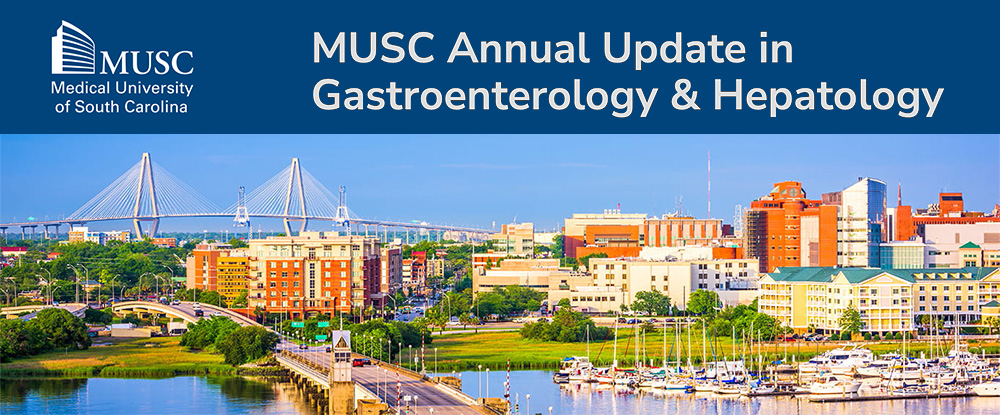
Here are the “Cliff Notes” to MUSC’s 2024 Gastroenterology & Hepatology Update! If you attended and have an addition or have any questions for those who did attend feel free to share them in the comment section below…
• Hepcidin, a peptide hormone produced in the liver, plays a crucial role in iron homeostasis.
• Both chronic liver disease & EtOH decrease hepcidin, leading to increased iron deposition in liver.
• In hereditary hemochromatosis (HH), type 1 (“classical”) is the most common in the world.
• Liver biopsy should not be performed in patients with clear diagnosis of hemochromatosis (based on blood tests) & no evidence or concern of cirrhosis
• If the ferritin is > 1,000 can now do Fibroscan instead of liver biopsy.
• If ferritin <1000, incidence of fibrosis is < 2%
• If phlebotomy x 1-2 times reduces ferritin to normal, question the HH diagnosis
• Typical HH pt needs weekly phlebotomies for 16 weeks (removes ~4g Fe from liver)
• Start treatment in men: ferritin > 300 ng/ml & TS > 50%,
in women: ferritin > 200 ng/ml & TS > 45%.
• In HH, the target ferritin level is 50-100; do weekly phlebotomy to reach this goal.
• Only hemochromatosis patients with cirrhosis need surveillance
• AVMs account for 30-40% of small bowel bleeding, which only accounts for 5-10% of all GI bleeding
• APC is preferable to BICAP for treatment of duodenal AVM’s.
• Long-acting octreotide 40 mg q 4 wks is effective for recurrent SB AVM bleeding – consider sooner
• Other agents: thalidomide, bevacizumab
• AI might augment capsule endoscopy more in the future (shortens reading time).
• 5% of adult U.S. population has Barrett’s. We are under-screening for Barrett’s!
• New ACG Recommendation: a swallowable, capsule sponge device (combined with a biomarker) is an acceptable non-endoscopic alternative for Barrett’s screening in chronic GERD & other risk factors
• The “sponge on a string” cell collection method for Barrett’s screening might increase in use among PCPs in the future.
• NBI is underused in Barrett’s screening and should probably be used in all cases to make endoscopic diagnosis.
• If patient is 40-50 yrs old and has negative Barrett’s screen, they are unlikely to develop it in future, so no need to re-screen.
• New acronyms: PEEN & PEEC in setting of nonydplastic Barrett’s (NDB)
• PEEN = Post-Endoscopy Esophageal Neoplasia (PEEN): EAC or BE-HGD detected before next recommended surveillance
• PEEC = Post-Endoscopy Esophageal adenoCarcinoma (PEEC): EAC detected before next recommended surveillance (accounts for 24% of esoph adenoca)
• Hepatorenal syndrome is renamed “cirrhosis-AKI” = creat 1.3 or greater in presence of ascites not responding to holding diuretics and albumin infusion.
• Terlipressin (avoid if creat >3) is superior to Levophed, which is superior to midodrine/octreotide for cirrhosis-AKI.
• ½ of population has a GI motility disorder.
• Pyloric Botox for gastroparesis is of little benefit; the jury is still out on G-POEM.
• Probiotics can also be a cause of SIBO by overpopulating the SB with bacteria
• An orally ingested vibrating capsule is FDA-approved for chronic idiopathic constipation.
• 60% of IBS-D is post-infectious.
• 11% of gastroenteritis cases will result in IBS.
• IBS and SIBO are not exactly the same thing, but they are highly linked together.
• Hydrogen sulfide is the cause of diarrhea, cramps, urgency, and bloating.
• Methane is the cause of constipation and bloating.
• SIBO breath test is predictive of response to Xifaxan.
• IBS is now thought of more as a small bowel microbiome disease than a colon disease.
• The main underlying pathophysiology in IBS is probably vinculin Ab affecting the interstitial cells of Cajal (ICC).
• Liver bx not needed for PBC dx.
• AlkP and bili predict long term outcomes in PBC.
• Get Fibroscan to stage PBC.
• Most PBC-AIH overlap is really just PBC (pathologist tend to exaggerate the autoimmune side on liver biopsy).
• Only 40% of PBC responds to Urso.
• New agents for PBC are PPAR agonists: Iqirvo (elafibrinor) and Livdelzi (seladelpar) – combo therapy likely the way of the future.
• The # 1 cause of death in MASLD is cardiac disease, particularly CHF-associated cirrhotic cardiomyopathy, so be quicker to get echo in cirrhotics with fatigue.
• Point of care intestinal US for IBD very useful for real time decision making but takes a lot of training.
Enumerate. Educate. Engage.




This is a great review. Almost like being there.
What an amazing collection of experts presenting at a mini-regional meeting that day.